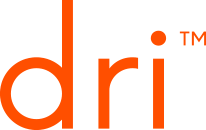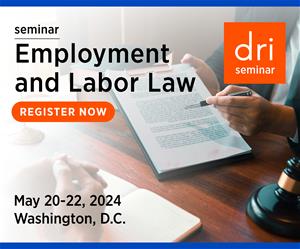Young Lawyers: Raising the Bar
Chair's Corner
By Emily Ruzic
The Young Lawyers Committee is having another great year! Below are a few highlights of upcoming activities.
- On March 2, we will host our Annual Leadership Meeting (or the “Fly-In Meeting”) in Miami, Florida. The Leadership Meeting is an invite-only planning meeting with a heavy focus on networking amongst committee leadership. No CLE is awarded. There is a networking dinner on March 1 and programming on Saturday that includes diversity, wellness, and philanthropic components, along with leadership training. If you would like to attend next year, be on the lookout for leadership applications following our seminar, taking place on June 12-14 in Nashville, TN.
- Speaking of the seminar, March 14 is the Members-Only Early Bird registration deadline. This is an opportunity for ultra-discounted pricing. Not sure if you can make it? Register now and take advantage of DRI’s refund policy, which offers a full refund up to 30 days before the seminar and the opportunity to transfer the registration to another member of your firm until the seminar begins. This year’s program includes speakers from Ford Motor Company and Walmart, along with a current federal judge. You don’t want to miss it!
- On March 27, 12 members of our committee will be sworn into the United States Supreme Court, on the motion of former DRI President, John Parker Sweeney (Bradley Arant Boult Cummings LLP). The admittees will gather for a celebratory dinner the night before. We plan to make this trip again in 2025. If you are interested, look out for information in Q4 of 2024.
- In May, our committee will jointly host an online CLE session with DRI’s Diversity and Inclusion Committee. This session will be free to all DRI members and is part of an 8-part CLE series, included with your DRI membership. More details to come!
If you are looking to get more involved, please don’t hesitate to contact me at eruzic@bradley.com. I’d love to help you make the most out of your membership.
 Emily Ruzic is a Partner at Bradley Arant Boult Cummings LLP in Birmingham, AL. She is Chair of the Young Lawyers Committee.
Emily Ruzic is a Partner at Bradley Arant Boult Cummings LLP in Birmingham, AL. She is Chair of the Young Lawyers Committee.
An Update on the YL Community Page
By Nicholas Bartlett and Lauren Motes
As new members of DRI, we understand how intimidating the organization can seem. The Young Lawyers Committee, however, provides a unique opportunity for those new to the practice. The YLC hosts great events at many DRI seminars and events. Now, that same comradery and access to YLC members are available online.
The DRI Online Community Subcommittee is excited to roll out (*cue Schitt’s Creek reference*) the Young Lawyers Community Page, available on DRI’s website with your member log-in. Yes, this page has been available in the past, but this year we are engaging the YL Subcommittees to share news, topics of interest, or really anything on a more consistent basis. Our Subcommittee is responsible for maintaining the Communities Page. This year, with help of the YL Executive Committee, we are opening the platform to each YL Subcommittee, and we encourage your engagement and collaboration.
The Community Page provides easy access to the YL Community by simply creating and publishing a post. Each week, you will hear from a different YL Subcommittee, with posts aimed at connecting and engaging the group. These posts can pertain to any topic. Think of that deposition you have out of town next month that you need dinner recommendations for. Or, do you have a practical question about a subject matter? Hopefully Q1 of 2024 started out strong for you and your practice. We hope the Community Page provides another opportunity for YL members to connect with like-minded members, engage in meaningful discussion, and grow your network.
Any YL member should feel free to create their own post by visiting the Communities Page. To create a new post, follow these steps:
1. Go to DRI.org.
2. Log in to your account.
3. Click on “My Communities” in the top right corner of the home page.
4. Expand the “Communities” drop down and select “My Communities.”
5. Under “Young Lawyers” click on the “Discussion” tab.
6. Click on the green “Post New Message” button.
7. Fill out the subject line and body sections and then click to post the message.
 Nicholas Bartlett is an associate at Eastman & Smith in Toledo, Ohio. He is part of the firm's Business Litigation, Eminent Domain, and Professional Liability Practice Groups. He serves as the Online Community Chair for DRI's Young Lawyers Committee.
Nicholas Bartlett is an associate at Eastman & Smith in Toledo, Ohio. He is part of the firm's Business Litigation, Eminent Domain, and Professional Liability Practice Groups. He serves as the Online Community Chair for DRI's Young Lawyers Committee.
 Lauren Motes is a Commercial Litigator at Dinsmore & Shohl LLP in Morgantown, West Virginia. She represents insurance companies in matters with the West Virginia Offices of the Insurance Commissioner and works with insurers to maintain compliance with applicable regulations, in addition to litigating a broad range of commercial matters throughout West Virginia. Within DRI, Lauren is on the Young Lawyers’ Steering Committee and is the Vice Chair for the Center’s Social Inflation Task Force.
Lauren Motes is a Commercial Litigator at Dinsmore & Shohl LLP in Morgantown, West Virginia. She represents insurance companies in matters with the West Virginia Offices of the Insurance Commissioner and works with insurers to maintain compliance with applicable regulations, in addition to litigating a broad range of commercial matters throughout West Virginia. Within DRI, Lauren is on the Young Lawyers’ Steering Committee and is the Vice Chair for the Center’s Social Inflation Task Force.
YLC Member Spotlight—Valerie Phan
 Valerie Phan is a Litigation Associate at Mintz, Levin, Cohn, Ferris, Glovsky and Popeo, P.C. Mintz is a general practice, full-service Am Law 100 law firm and its core practice areas are Transactional, Intellectual Property, Litigation & Investigations, and Regulatory & Advisory. Valerie handles a variety of business, complex commercial, and trademark litigation.
Valerie Phan is a Litigation Associate at Mintz, Levin, Cohn, Ferris, Glovsky and Popeo, P.C. Mintz is a general practice, full-service Am Law 100 law firm and its core practice areas are Transactional, Intellectual Property, Litigation & Investigations, and Regulatory & Advisory. Valerie handles a variety of business, complex commercial, and trademark litigation.
Valerie graduated from the University of San Diego School of Law, during which she successfully tried her first case as a certified legal intern representing a tenant against a landlord on behalf of USD’s Small Claims Clinic. Valerie was active in national and international moot court competitions, including the Vis Commercial Arbitration Moot (VICAM) where she competed in both the Hong Kong and Vienna moots, and was elected to serve on USD’s Honor Court.
During law school, Valerie served as a judicial extern to the Honorable M. James Lorenz, and after graduation she served as a judicial law clerk to the Honorable Roger T. Benitez, both of the U.S. District Court for the Southern District of California.
Valerie is currently admitted to practice in California and serves as a Lawyer Representative for the U.S. District Court for the Southern District of California. She is active with DRI, serving on the Young Lawyers Steering Committee as the Chair of the Seminar Planning Subcommittee. Valerie is also an active alumna of USD, providing formal and informal mentoring to law students and volunteering as a judge for various moot court competitions.
How and why did you first get involved with DRI?
Several attorneys at my prior firm were active members of DRI and former members of the Young Lawyers Steering Committee and encouraged me to join and apply for a leadership role. They shared a plethora of stories about how DRI helped them build an authentic network and lifelong friendships and business relationships, all of which were appealing to me.
What is your favorite part of being a lawyer?
It’s really two favorite parts. I enjoy helping my clients achieve their litigation goals, whether it is defending against baseless claims throughout the life of the case and, if necessary, at trial, or extricating them from unfortunate circumstances through settlement negotiations and mediation. I also just really love the practice of law. There is something satisfying about finding on-point, favorable, and binding authority to flash in legal briefs, and there is nothing quite standing up in court and arguing your position to a judge.
What is the best advice you have been given relating to the practice of law?
Your best advocacy comes from being confident in your individual style and voice—don’t try to be someone else. Take what you like from others and modify it to feel comfortable and natural for you.
When you are not practicing law, what do you enjoy doing?
Spending time with family and friends and traveling as much as possible. I really enjoy exploring and photographing cities, trying new foods, and meeting people from around the world.
What was your favorite non-lawyer job?
I worked as a stunt double once—in between undergrad and law school, I moved to Queenstown, New Zealand and worked for AJ Hackett Bungy. Air New Zealand was shooting a promotional video at the bungy site I was working at, and their actress was too scared to do the actual jump. Long story short, I happened to be a match for the actress, so I was hired on the spot to be her stunt double.
Interested in joining the Young Lawyers Committee? Click here for more information.
Print this section
Print the newsletter
Young Lawyers: Raising the Bar (Cont.)
Practicing Law Post-COVID-19
By Pamela Haug
Most attorneys spent months or years working from home during the COVID-19 pandemic. Many of us have returned to in-person work, but there are lessons we learned while working from home that will help just as much in an office. The first thing we learned during COVID-19 was that we were not in control. This forced us to adapt and think of creative ways to do our jobs. Now that we are back in the office, we can use the practical, social, and mental health lessons that we learned during our time at home to become even better attorneys.
Practical Lessons: Maintaining Workload
Practical skills are vital to the success of every attorney’s career. One practical challenge that young attorneys face is the need to find work so they can meet their billable hour requirement. Some firms may assign cases regularly, but for others, it is not that simple. While working from home, attorneys had to stay on people’s radars so that their flow of work continued. This required creative thinking and additional time spent on top of the day-to-day legal work. Finding a way to stay top of mind to receive work is a practical skill that we can use as we return to the office.
One way to stay on people’s radars so that you can find work is to regularly volunteer. There may not be meetings where people request volunteers or emails go out looking for the same. You may need to reach out to individual partners or senior associates to ask if you can help. Even if the answer is no, these people will think of you when there is work to be done.
Another way to remain in the work-assigning loop is to ask those same attorneys well-thought-out questions about the tasks you receive. This shows that you are not only capable of completing the work but that you are also analyzing how this case may apply to others you receive. It may be intimidating to ask a more experienced attorney questions, but most people will respect the time it takes to come up with a purposeful question.
A final way to stay top of mind is to regularly check in with attorneys who have given you work. Setting calendar reminders in your phone or on your computer is a quick and easy way to do this. If someone tells you they may need help in two weeks, put that into your calendar and make sure to follow up. This is a simple way to show you are invested in gaining experience and that you are organized.
There are many ways to find work at your firm so that you continue to grow as an attorney. There are practical methods we learned by working from home that easily translate to the office. The main goal is to stay on people’s minds by volunteering to help, asking well-thought-out questions, and regularly checking in with those who can assign you work. With these practical skills, you should be able to meet your hourly requirements without issue.
Practical Lessons: Time Management
A second skill that working from home taught us was time management. At first, there were periods of shock and confusion on how to adjust to the new normal. Then, we adjusted to working from home and learned how best to manage our time. One thing we quickly learned was distractions at home were plentiful. Why not take 30 minutes to watch a show when there was a break in meetings? There are similar, albeit not as fun, distractions now that we are back in the office. People stop by to chat, and there never is enough coffee. A few ways to manage time wisely that we used at home and in office are to take regular breaks, schedule time for individual tasks, and separate your work from home.
Taking regular breaks may seem the opposite of time management. However, giving your brain time to rest and your body time to move throughout the day is the best way to maintain productivity. While working from home, I took regular walks with my dog. The brief break from sitting and using a computer gave me energy throughout the day. Even though we are in the office, you can take a ten-minute break to walk around the block or through your building. It will do amazing things for your energy levels. To take breaks a step further, try not to use your phone or distract yourself with other technology. Your mind will thank you for this technology-free reset.
Another way we learned to manage time during COVID-19 was to schedule time for individual tasks, such as checking emails. Without another attorney working beside us, it was easy to flutter between one task and another. However, those who created a routine were able to complete their work with more efficiency. It is smart to continue this in office. Schedule an hour in the morning and an hour in the afternoon to check emails. Allow yourself flexibility to receive and respond to important emails, but having this type of routine will make your day more efficient and limit distractions.
The final time management skill that we learned while working from home was how to separate work from our home lives. It would be nearly impossible to bill and complete every assignment each day if you were consistently stopping to do housework. Physically removing yourself from the home was impossible so we had to adapt by creating a home office or dedicating a section of our home to work. Being back in the office does not mean that this skill is not useful. We constantly get texts and emails on our personal phones. Separate that part of your home life by putting your phone on silent for portions of the day. There may be emergencies that arise but to intentionally focus on work while you are in the office will aid in your ability to manage your time.
Managing our time while working from home was a real test of willpower. You had all your favorite things surrounding you every day and were still expected to get work done. We managed to do it, though, and can continue to use what we learned now that we are back in the office. Taking regular breaks, scheduling time for specific tasks, and separating our personal lives from our home lives will help as we continue to manage it all from the office.
Social Lessons: Maintaining Connections
In addition to the practical skills we learned while working from home, we learned how to maintain social connections in a world where we were separate from other humans. All social events came to a halt but still we found a way to engage with other attorneys and keep those professional networks afloat. We did that by trying new ways of meeting people, joining professional organizations, and being active in local bar associations. These are all good ways to remain social now that we are back in the office.
We had to find new ways to connect with people during COVID-19. Zoom happy hours and Teams meet-ups were common but very awkward at first. Still, we did it because social connections are important to our careers and our health. We should continue to put ourselves out there even though we are now back in the office. To younger attorneys, this can be daunting. A lot of firms have social events that while not required, are hugely beneficial. Attend those and meet other people at your firm. You will be glad you did when the discussion for partnership or promotion arises in the future.
Another way to maintain social connection is to join professional organizations. You will meet like-minded people whom you can engage with on topics you enjoy. The term networking is scary to a lot of people. One thing I have learned as a regular networker is that everyone is equally nervous to engage in networking. Once you realize that, joining and interacting with others in a professional organization seems less scary.
Finally, being active in bar associations is another way to stay connected with other attorneys. All of us are members of our state bars but being active requires more than just signing the roll of attorneys. Attend CLEs or networking events hosted by your bar association. You will learn something and could meet someone who can help in your career. Being active does not require all your time. Whatever time you can give is enough.
We faced many difficulties while working from home. Not being able to see or connect with others was at the top of that list. Today, we can use what we learned about how to connect with others during that isolation to help us be better lawyers. We have to continue to put ourselves out there even if it is scary. Joining professional organizations and being active in our bar associations will also help us remain connected to our network.
Mental Health Lessons
The final lesson that COVID-19 taught us was to take care of our mental health. The time we spent away from our loved ones and isolated from everything we knew took a huge toll on our health. Many attorneys struggle already with maintaining their mental health, and COVID-19 just exacerbated this. We know now how important it is to treat mental health as health and this should continue as we return to the office.
The first way we can take care of our mental health is by taking advantage of firm-provided mental health benefits. Some firms offer benefits for therapy or meditation services like Headspace to support your mental health. Many firms provide Employee Assistance Programs that support mental healthcare as well. Many of these benefits are free and confidential. Make sure to look at your firm’s benefits so that you can maintain your mental health as you return to the office.
Another thing we did during COVID-19 was take time off for our mental health. It may not have been a full day, but there were times I took off strictly to rest and reset during COVID-19. It was a very high-pressure, uncertain time and I knew it would help me in the long run. We should continue not being afraid to take time off for our mental health. It is just as important as our physical health, and we will return to the office ready to face another day.
Summary
Working from home during the pandemic was a unique time in our lives. Attorneys like to be in control of everything in their lives. COVID-19 knocked us down a peg to teach us that we are never fully in control. However, we can take what we learned during COVID-19 about skills like maintaining workload, managing time, continuing to be social, and protecting our mental health as we return to the office. We will be better lawyers for getting through such a difficult time and using what we learned to improve ourselves and our careers.
 Pamela Haug is an Account Executive in Lexitas’ Legal Talent Outsourcing division. She focuses on temporary and permanent placement of attorneys and paralegals. Pamela is a committee member of the DRI Young Lawyer Publications Subcommittee for the Brief Case. She is on the Executive Board for the Young Lawyers Division of the Bar Association of St. Louis and is a candidate for Alderwoman in the city of Ballwin, Missouri.
Pamela Haug is an Account Executive in Lexitas’ Legal Talent Outsourcing division. She focuses on temporary and permanent placement of attorneys and paralegals. Pamela is a committee member of the DRI Young Lawyer Publications Subcommittee for the Brief Case. She is on the Executive Board for the Young Lawyers Division of the Bar Association of St. Louis and is a candidate for Alderwoman in the city of Ballwin, Missouri.
Interested in joining the Young Lawyers Committee? Click here for more information.
Insurance Law: Covered Events
Leadership Note from the Canadian Defence Lawyers
By Marcus Snowden
Canadian Defence Lawyers is a northern sibling (an “NLDO” rather than a “SLDO”) to DRI, representing the interests of business and the defense bar across Canada. The Canadian/Cross-Border issues subsection acts as a resource for projects and programs of common interest to Canadian and US members of the ILC in collaboration with our counterparts, drawing as needed on members of CDL’s ILC. We provide speakers as and when needed and will also be looking to collaborate on programming of mutual interest. We are looking forward to an exciting year for CDL and the Canadian/Cross-Border subsection Law subsection.
CDL members enjoyed being active participants in the DRI Annual General Meeting in San Antonio this past October. The AGM was a great opportunity to share insights, ideas, and experiences from both sides of the Canada/US border. CDL past president Susan Gunther received recognition along with her US co-authors for a white paper which was well received by DRI members. CDL has recently appointed Brett Rideout, also a new DRI member, as Canadian liaison for The Center for Public Policy where he will continue our tradition of cross-border dialogue, leveraging his role on CDL’s equivalent.
CDL has had a number of very successful conferences over the course of the winter and spring, including sessions on Professional Liability (including a live Examining and Cross-examining of Expert Witness session), Young Lawyer Practical Skills, Costs, and a joint webinar presented with the Forum of Insurance Lawyers (UK) on the Use of Generative AI by Defence Lawyers.
Notable upcoming events in the CDL calendar include the Annual Law Clerks Program (March), the In-House Symposium (April) and the Class Action Symposium in Halifax Nova Scotia (June). For DRI ILC members, one of CDL’s flagship events modeled on DRI’s New York symposium is the upcoming Insurance Coverage Symposium to be held in the last week of April in Toronto. These events are sure to be engaging and informative. For those ILC members within traveling distance, you are always most welcome and encouraged to attend. If you give the chair “heads up,” we will do our best to look out for you while you’re “north of the border.” We look forward to seeing our DRI ILC colleagues soon, including at the ICCI program in Chicago.
 Marcus Snowden is the principal of Snowden Law P.C. He practices in Toronto, Ontario, Canada and is also licensed in the province of Manitoba. His practice focuses on commercial insurance coverage opinion, monitoring counsel, trial and appellate work for Canadian, U.S. and international insurers. He has served the DRI's Insurance Law Committee in various capacities since joining in 1991 and was inaugural chair of the Canadian Defence Lawyers association's Insurance Coverage Law committee.
Marcus Snowden is the principal of Snowden Law P.C. He practices in Toronto, Ontario, Canada and is also licensed in the province of Manitoba. His practice focuses on commercial insurance coverage opinion, monitoring counsel, trial and appellate work for Canadian, U.S. and international insurers. He has served the DRI's Insurance Law Committee in various capacities since joining in 1991 and was inaugural chair of the Canadian Defence Lawyers association's Insurance Coverage Law committee.
Interested in joining the Insurance Law Committee? Click here for more information.





